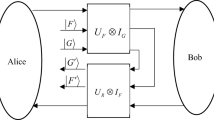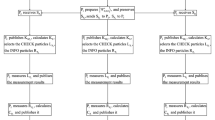Abstract
To address the risk of spoofing the information exchanged by users and reduce the trustworthiness of third party, we propose a quantum information fair exchange protocol based on three-particle GHZ states. This protocol achieves quantum multi-party fair exchange of secret information through the utilization of three-particle GHZ states, Pauli matrix, a semi-trusted third party, and polarization state of a single photon. By leveraging the unique physical properties of the GHZ state, this protocol achieves fair exchange of secret information with experimental results that align with theoretical derivation, thus demonstrating its feasibility. Additionally, it provides superdense coding which enhances transmission efficiency while also being resistant to false signal attacks, interception retransmission attacks, and entanglement attacks, ultimately improving security. Furthermore, compared with the classic fair exchange protocol, which requires a trusted third party, it only requires a semi-trusted third party, which raises the security from “computational security” to “unconditional security”. The implementation of this protocol resolves the risk of users who hand over information first, presenting a novel solution for digital currency trading, information swapping, and multi-party secure computing.







Similar content being viewed by others
Explore related subjects
Discover the latest articles, news and stories from top researchers in related subjects.Data availability
The data used to support the findings of this study are available from the corresponding author upon request.
References
Asokan, N., Schunter, M., Waidner, M.: Optimistic protocols for fair exchange. In: Proceedings of the 4th ACM Conference on Computer and Communications Security, pp. 7–17 (1997)
Dan, B., Naor, M.: Timed commitments. In: Advances in Cryptology-CRYPTO’2000, pp. 236–254. Springer, Berlin (2000)
Jan, C., Anna, L., Mira, M.: Endorsed e-cash. In: IEEE Symposium on Security and Privacy, pp. 101–11. IEEE, US (2007)
Cox, B., Tygar, J.D., Sirbu, M.: NetBill security and transaction protocol. In: Usenix Workshop on Electronic Commerce, pp. 6–6 (1995)
Deng, R.H., Gong, L., Lazar, A.A., et al.: Practical protocols for certified electronic mail. J. Netw. Syst. Manag. 4(3), 279–297 (1996)
Asokan, N., Shoup, V., Waidner, M.: Optimistic fair exchange of digital signatures. IEEE Press, New York (2006)
Christian, C., Jan, C.: Optimistic fair secure computation. In: Advances in Cryptology CRYPTO 2000, Berlin, pp. 93–111 (2000)
Dodis, Y., Reyzin, L.: Breaking and repairing optimistic fair exchange from PODC 2003. In: DRM Proceedings of ACM Workshop on Digital Rights Management, pp. 47–54 (2003)
Yao, C.C.: How to generate and exchange secrets. In: 27th Annual Symposium on Foundations of Computer Science, pp. 162–167. IEEE, US (1986)
Chaum, D., Damgard, I.: Multiparty unconditionally secure protocols. In: Advances in Cryptology-CRYPTO 1987, A Conference on the Theory and Applications of Cryptographic Techniques, Santa Barbara, pp. 11–19 (1988)
Belenkiy, M., Chase, M., Erway, C.C., et al.: Incentivizing outsourced computation. In: ACM SIGCOMM 2008 Workshop on Economics of Networked Systems, Seattle, WA, USA, pp. 85–90 (2008)
Garay, J.A., Jakobsson, M., Mackenzie, P.D.: Abuse-free optimistic contract signing. In: International Cryptology Conference on Advances in Cryptology, pp. 449–466 (1999)
Coretti, S., Garay, J., Zikas, V., et al.: Constant-round asynchronous multi-party computation based on one-way functions. In: Advances in Cryptology-ASIACRYPT, pp. 998–1021 (2016)
Jiang, Y.H., Zhang, S.B., Dai, J.Q., et al.: Quantum secret information equal exchange protocol based on dense coding. Mod. Phys. Lett. B 32(10), 1850125 (2018)
Cai, X.Q., Wang, X.X., Wang, T.Y.: Fair and optimistic contract signing based on quantum cryptography. Int. J. Theor. Phys. 58, 3677–3683 (2019)
Lohr, M., Skiba, K., Konersmann, M., Jürjens, J., Staab, S.: Formalizing cost fairness for two-party exchange protocols using game theory and applications to blockchain. In: 2022 IEEE International Conference on Blockchain and Cryptocurrency (ICBC), Shanghai, China, pp. 1–5 (2022)
Furukawa, S., Kunihiro, N., Takashima, K.: Multi-party key exchange protocols from supersingular isogenies. In: 2018 International Symposium on Information Theory and Its Applications (ISITA), Singapore, pp. 208–212 (2018).
Yoshiaki, S., Masakatu, M., Masamim, et al.: A three-party optimistic certified email protocol using veryfiably encrypted signature scheme forline topology. In: IEEE 2nd International Conference on Cyber Security and Cloud Computing, pp. 260–265 (2015)
Acknowledgements
This research is supported by National Key Research and Development Program of China (No. 2020YFE0200600), National Natural Science Foundation of China (No. U22B2026), and Science Foundation of Xizang Minzu university (No. 23MDQ01).
Author information
Authors and Affiliations
Corresponding author
Ethics declarations
Conflict of interest
The authors declare that there is no conflict of interest regarding the publication of this paper.
Additional information
Publisher's Note
Springer Nature remains neutral with regard to jurisdictional claims in published maps and institutional affiliations.
Rights and permissions
Springer Nature or its licensor (e.g. a society or other partner) holds exclusive rights to this article under a publishing agreement with the author(s) or other rightsholder(s); author self-archiving of the accepted manuscript version of this article is solely governed by the terms of such publishing agreement and applicable law.
About this article
Cite this article
Jiang, Y., Chen, L., Gong, X. et al. Quantum multi-party fair exchange protocol based on three-particle GHZ states. Quantum Inf Process 22, 353 (2023). https://doi.org/10.1007/s11128-023-04102-1
Received:
Accepted:
Published:
DOI: https://doi.org/10.1007/s11128-023-04102-1




